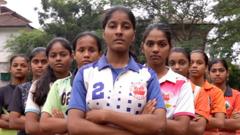The new policy is seen as a crucial step to protect women in athletics and maintain fair competition standards.
**Track and Field Implements DNA Testing for Female Athletes Amid Eligibility Debate**

**Track and Field Implements DNA Testing for Female Athletes Amid Eligibility Debate**
World Athletics announces the introduction of DNA sex tests for women competitors, aiming to enhance integrity in female sports.
Track and field will pioneer a new requirement in the sports world by implementing mandatory DNA sex testing for female athletes, marking a historic shift within Olympic sports. Announced by Sebastian Coe, head of World Athletics, the new policy aims to address ongoing concerns over eligibility criteria in women’s events, particularly following controversies that arose at the Paris Olympics concerning gender qualifications, which led to heated discussions both in and out of the ring.
Coe emphasized that the changes are essential for safeguarding women's sports, stating that the testing process, which will involve a simple cheek swab or dry blood DNA collection, reflects an unwavering commitment to the integrity of female athletics. He expressed confidence that the DNA tests could be operational by the upcoming world championships scheduled in Tokyo this September.
"We’re not just discussing the integrity of women's sports, but actively ensuring it," Coe remarked during a press conference in Nanjing, China. He described the newly instituted policy as a critical measure to maintain public confidence and commitment to fair competition.
Since 2023, World Athletics has taken a firm stance by banning transgender athletes from competing in women’s categories. The ongoing dialogue concerning women’s eligibility continues to evoke polarized opinions, played out extensively across social media platforms. As the landscape of athletics evolves, this decision is likely to shape the future of female competitions in the sport.
Coe emphasized that the changes are essential for safeguarding women's sports, stating that the testing process, which will involve a simple cheek swab or dry blood DNA collection, reflects an unwavering commitment to the integrity of female athletics. He expressed confidence that the DNA tests could be operational by the upcoming world championships scheduled in Tokyo this September.
"We’re not just discussing the integrity of women's sports, but actively ensuring it," Coe remarked during a press conference in Nanjing, China. He described the newly instituted policy as a critical measure to maintain public confidence and commitment to fair competition.
Since 2023, World Athletics has taken a firm stance by banning transgender athletes from competing in women’s categories. The ongoing dialogue concerning women’s eligibility continues to evoke polarized opinions, played out extensively across social media platforms. As the landscape of athletics evolves, this decision is likely to shape the future of female competitions in the sport.






